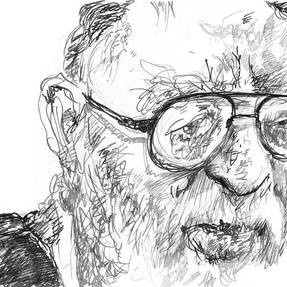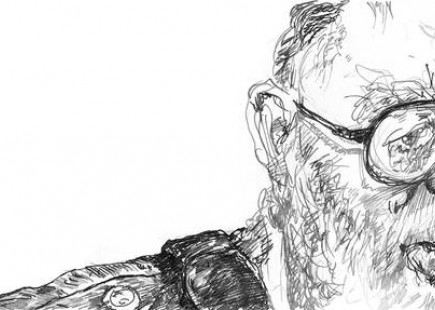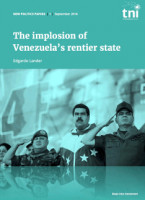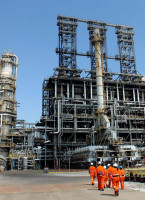The "unconditional solidarity" of the left with Chavismo Natalia Uval (La Diaria, Montevideo) talks with Edgardo Lander
Temas
The Latin American left’s unconditional support of Chavismo has reinforced the negative tendencies of the Venezuelan experience. Many leftists around the world have not learned from past mistakes and end up endorsing “mafia governments” such as that of Nicaragua, and that “when the Venezuelan model collapses”, the international left may simply “look elsewhere”.


Edgardo Lander is not only an academic, a Professor at the Central University of Venezuela and a Fellow of the Transnational Institute, he is also an activist who has been linked to social movements and the left for many years. From this point of view, he affirms that the Latin American left’s unconditional support of Chavismo has reinforced the negative tendencies of the Venezuelan experience. He argues that many leftists around the world have not learned from past mistakes and end up endorsing “mafia governments” such as that of Nicaragua, and that “when the Venezuelan model collapses”, the international left may simply “look elsewhere”.
Three years ago you had characterised the situation in Venezuela as the “implosion of the oil rentier mode”. Is this diagnosis still valid?
Unfortunately, the problems associated with the depletion of the oil rentier model have been accentuated. The fact that Venezuela has evolved around an oil-driven and state-centred economy over the past 100 years has shaped how income is distributed by a particular kind of state and ruling party, and has created a political culture and collective imaginaries of Venezuela as a wealthy country characterised by abundance and the idea that political action consists of organising to demand more from the state. That is the founding logic. And these tendencies have been aggravated during the Bolivarian experience, despite many discourses that seemed to point in the opposite direction.
From the point of view of economics, this colonial mode of insertion in the international division of labour and nature has been accentuated. The collapse of oil prices simply revealed something that’s obvious when a country depends on a single commodity that is subject to price fluctuations.
The criticisms around the deterioration of democracy in Venezuela have increased since Nicolás Maduro took office. Why is that so? How does it compare with Hugo Chávez’ governments?
First, we have to take into account what really happened in the transition from Chávez to Maduro. I’m of the opinion that most of the current problems are problems that were already embryonic when Chávez was in charge. The analyses proposed by part of the Venezuelan left, which claim that the time under Chávez was the golden epoch, in which everything worked well until Maduro suddenly enters the picture as an incompetent or a traitor, are too Manichaean explanations and don’t take into account the more structural roots of the current crisis.
The Venezuelan experience, to put it very schematically, was always based on two fundamental pillars: on the one hand, Chávez's extraordinary leadership and ability to communicate, which generated a strong social base; on the other hand, oil prices that went up to more than 100 dollars a barrel in some years. Almost simultaneously, in 2013, these two pillars collapsed: Chávez died and the oil prices took a deep dive. And the emperor was naked. It was clear that this model was very fragile and dependent on things that could not be further relied upon.
In addition, there are very important differences between Chávez's leadership and that of Maduro. Chávez was a leader who had the capacity to provide direction and meaning to the process, but he also held an extraordinary level of authority within the Bolivarian government as a whole. When he decided something, that was the final decision. During Chávez’s times there was some limited debate about many errors, but his style of leadership also enabled a unitary and more targeted kind of government. Maduro doesn’t have that capacity, he never had it, and now in the government everyone pulls in different directions.
On the other hand, during Maduro’s government there has been a greater tendency towards militarisation, perhaps because Maduro doesn’t come from the military world, so to guarantee the support of the armed forces he has had to incorporate into his government more members of the military and give them more privileges. New military companies have been created, and currently one-third of the ministers and half of the governors come from the armed forces and are in very strategic positions, which have led to higher levels of corruption via the allocation of foreign currency, the management of customs and imports and the distribution of food.
The fact that so many public administration and economic spaces are in the hands of the military makes it more difficult to manage transparently and prevents society from knowing what’s really happening.
What happened to the processes of social participation promoted by the Bolivarian governments?
Today, in Venezuela, we witness a disarticulation of the social fabric. After such extraordinarily rich experiences of social organisation and grassroots mobilisation, with movements mobilised around water health issues, telecommunications, land tenure and literacy, which involved millions of people and generated a new culture of confidence, of solidarity, of having the capacity to influence one's own future, one would assume that in times of crisis there would be a collective capacity to respond collectively. But it turns out that this hasn’t been the case. Of course, I speak in very general terms, as there are places where there’s still capacity for autonomy and self-government.
But in general terms it can be said that the most common social reaction today is more competitive and individualistic.
Anyway, I think there’s a social reserve that at some point could come to life again.
Why could earlier levels of social participation and organisation not be maintained?
The process was traversed from the outset by a very serious contradiction, which is the contradiction between a bottom-up understanding of grassroots organisation as a process of self-management and autonomy, and the fact that most of the current social organisations have been the product of public policies promoted from above, by the state.
And that contradiction had different manifestations in each local context. Where there was prior organisational experience, there were communal leaders who were able to confront the state; not to reject public intervention, but to negotiate with the government. In addition, starting in 2005 there was a transition in the Bolivarian experience, from the initial and very open approach that was concerned about building a social model different to both the Soviet style of organisation and liberal capitalism, towards declaring that the process was socialist and understanding socialism as a state-driven process. Cuban advisors had a strong political and ideological influence in that conversion.
Since then, social organisations began to be conceived as mere instruments to be directed from above, based on a top-down and Stalinist political culture that increased the levels of precariousness of social organisations.
What is the current situation of democratic institutions, in liberal terms?
Clearly, the problems are much more serious nowadays, because Maduro’s government has lost a lot of legitimacy and faces increasing levels of rejection by the population. And the opposition has made significant progress. The government was hegemonic in all spheres of public administration, until it lost the parliamentary election in December 2015. And from there it began to respond to its critics in increasingly authoritarian terms.
In the first place, the government decided not to recognise the authority of the National Assembly (parliament) after the electoral results enabled the opposition to gain a qualified majority, based on very questionable arguments. Subsequently, from the point of view of the government, the Assembly doesn’t exist or is treated as illegitimate. A few months ago it was necessary to renew the members of the National Electoral Council [CNE], but the Supreme Court also ignored the Assembly and decided to appoint the new members itself, who of course are all Chavistas. Every year, the President must submit an official administration report on the previous year to the Assembly, and since Maduro doesn’t recognise the Assembly, the latest report was submitted to the Court, instead.
The same thing happened with the national budget. The opposition had also organised a recall referendum, for which all legal steps had been followed. It had to take place in November last year, but the CNE decided to postpone it, and that meant killing the process: there’s simply no possibility of a referendum right now. According to the Constitution, the election of governors was also due in December of last year, but it has been postponed indefinitely.
So, we are in a situation where there’s a total concentration of power in the Executive branch, without any space for the Legislative Assembly. Maduro has been ruling under a self-renewing emergency decree for more than a year, which according to the law should be ratified by the Assembly.
In short, we are far from anything that could be called democratic. In such a context, the responses by the media and the opposition are increasingly violent, and the government's reaction, already incapable of doing anything else, but the repression of demonstrations and taking more political prisoners. All instruments of the state are used to preserve the positions of those in power.
What are the possible long-term outcomes of the crisis?
I’d say that there are three things that are extremely worrying, thinking about middle and long term perspectives.
In the first place, there’s a destruction of the productive basis of society, which would take a long time to recover. Recently, a presidential decree opened 112,000 square kilometres to large-scale transnational mining in a territory that’s the habitat of ten groups of indigenous peoples and where the country's largest water sources are located, in the Amazon jungle.
Second, the issue of how the depth of this crisis is disintegrating the basic fabric of society, which today is much worse than it was before Chávez took office. This is something very difficult to say, but it’s indeed the reality in which we live today in our country.
Third, how the living conditions, in terms of health and access to food, have worsened. The government stopped publishing official statistics and we’re forced to rely on statistics published by business chambers and universities, which indicate that there’s a systematic loss of weight among the Venezuelan population; some estimates say it’s around six kilograms per person. And that, of course, has consequences in terms of child malnutrition, with long-term effects.
Finally, we must consider the impact of the crisis in relation to the possibilities for thinking about alternatives. The notion of socialism, or the idea of alternatives in itself, are being ruled out in Venezuela. The notion that the public sphere is inherently inefficient and corrupt has been installed. It’s a real failure.
How do you see the reactions of parties of the left around the world, and especially in Latin America, when faced with the current situation in Venezuela?
I think one of the historical problems of the left has been how extraordinarily difficult we find it to learn from our experiences. To learn from experience, to think critically about what happens and why it happens, is absolutely essential.
Of course, we know the whole story of the complicity of communist parties with the horrors of Stalinism, and not for lack of information. It wasn’t an issue of not being aware of crimes committed by Stalin, it was complicity because they assumed that the left shouldn’t criticise parties or governments that are anti-imperialist, even when they kill millions of people.
I believe that such an approach, which conceives solidarity as unconditional solidarity when confronted with the left-right divide or anti-imperialist struggles, or in consideration of geopolitical contradictions that supposedly challenge the dominant sectors in the global system, prevents us from thinking about what’s going on and why. That kind of blind, non-critical solidarity, often means celebrating many things that end up being extraordinarily negative.
The rather authoritarian profile of Chavismo was something that was there from the beginning. And the same applies to the extractivist productive model that has been implemented.
So, why shouldn’t we open a debate on all these things, in order to think critically and make proposals? I’m not implying that the European left should come to tell us, the Venezuelans, how we should carry out a revolution, but I reject the uncritical celebration or justification of anything that might be wrong.
Political prisoners aren’t perceived as political prisoners; the deterioration of the economy is presented simply as the product of economic warfare and the concerted actions of forces of the right at the national and international levels. Some of those claims are partly true, it is there, but obviously they’re not enough to explain the depth of the crisis we’re experiencing today.
The Latin American left has a historical responsibility towards Cuba today, because for many years it assumed that Cuba should not be criticised as long as the country suffered under a blockade, but not criticising Cuba meant not having the possibility to reflect critically about the aims of the Cuban process and potential alternatives. For a large proportion of the Cuban population, the difficulties they faced were quite obvious at the individual level, but the Cuban government did not open ways through which alternatives could be explored. The Latin American left did not provide anything, except simply unconditional solidarity.
The most extreme case is to pretend that the Nicaraguan government is a revolutionary government, when in fact it’s a mafia government, absolutely corrupt, which from the point of view of women's rights is the most oppressive regime that exists in Latin America, based on an alliance with corrupt sectors of the bourgeoisie and the high command of the Catholic church, which in the past were the great enemies of the Nicaraguan revolution.
What should we say about that? We shouldn’t be reinforcing negative tendencies that should be made visible. But we don’t learn. If we understand the struggle for anti-capitalist transformation not as a struggle that takes place ‘down there’ and that therefore we should be supportive of what ‘they’ do, but as a struggle of all of us, then we should be aware that what you might be doing wrong might be affecting us too, and that we’re also responsible for learning from that experience in order not to repeat the same mistake.
But I’m afraid we have no ability to learn, because when the Venezuelan model collapses, we’ll look elsewhere. That kind of solidarity, that kind of internationalism, in terms of political and intellectual responsibility is a disaster.
Why does the left engage in what you refer to as ‘uncritical solidarity’?
In part, it has to do with the fact that we’ve not finished our process of getting rid of one-dimensional conceptions of what is at stake, which has characterised much of the thinking of the left. If what’s at stake is the class content and anti-imperialism, we tend to judge in a specific way. But we should understand that emancipatory transformation is not limited to that, and we should expand our approach to include critical feminist perspectives and other forms of thinking about and relating with nature.
Moreover, our understanding of democracy should not be constrained to just discarding bourgeois democracy, and we should think about how to deepen democracy. Transformation should be multidimensional, because domination is also multidimensional.
Therefore, why such uncritical support of leftist governments that continue to ignore the rights of indigenous peoples, engage in environmental devastation or promote the reproduction of the patriarchy?
The left has developed a very monolithic understanding of what is supposed to be the anticapitalist transformation, which does not take into account the complexities of today’s world. What would be the point of liberating ourselves from Yankee imperialism if we establish an identical subordinate relationship with China? There is a political, theoretical, ideological and even perhaps generational problem.
For many people, what we see today in Venezuela was their last bet for an alternative society, and they’re not ready to accept that it has failed.
Did you enjoy this content? Then please consider supporting TNI.
Support our crucial research and help us to work on the critical issues of our time. We work at the crossroads of movements, activists, policy makers and scholars to enhance public debate and turn ideas into movement. Become a supporter now.



